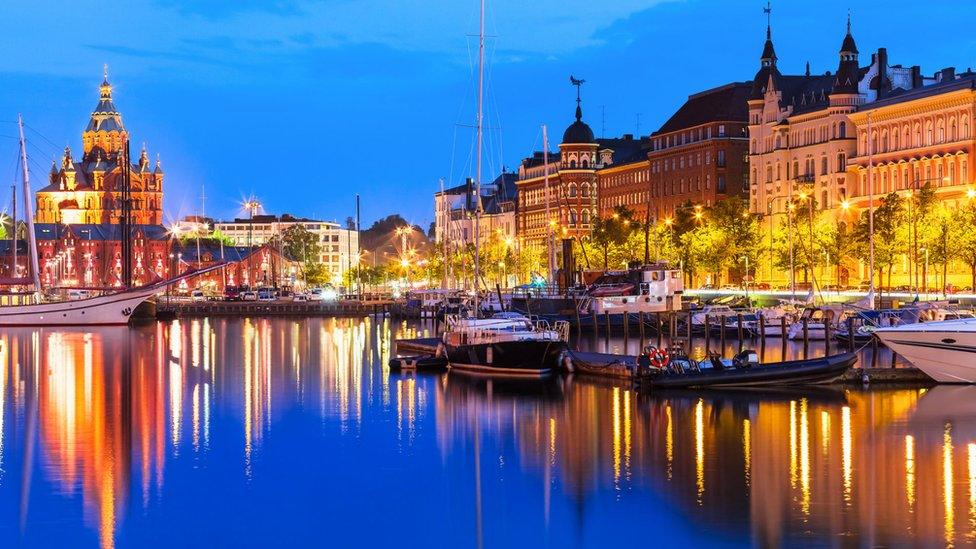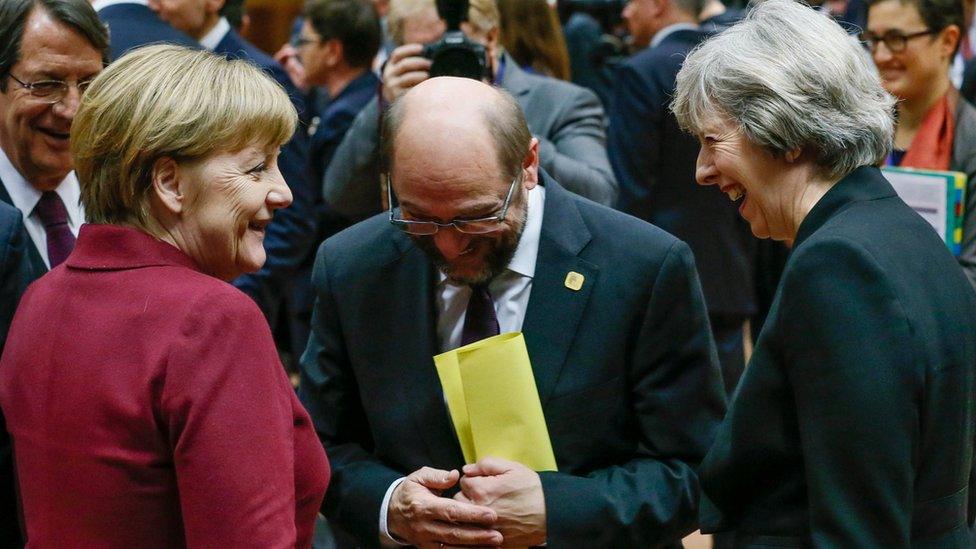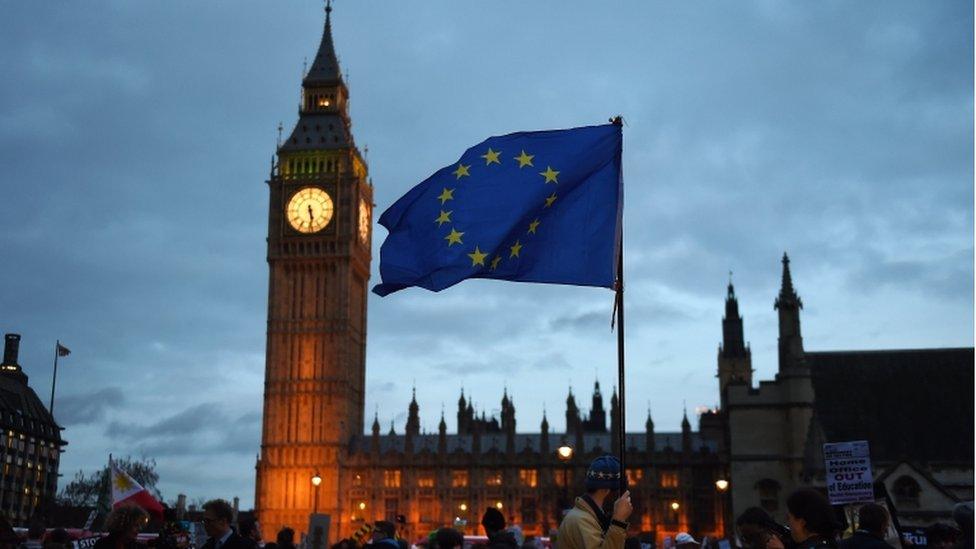Britons in Finland face uncertainty over their future
- Published
- comments

The majority of British expats in Finland live in Helsinki
The triggering of Article 50 sets Britain on course to quit the European Union - but where does that leave Britons currently working in EU countries such as Finland?
Let's start with a few facts about Finnish grammar (hang on in there, the relevance is coming).
Finnish has 15 different cases, meaning that there is a different word for "building" according to whether you are on your way to it, coming from it, or perhaps stuck inside it.
Finnish is also fiendishly difficult for foreigners to pronounce, with a subtle difference between for example "tuli" meaning fire, and "tuuli" meaning wind.
"I tried learning it, but gave up after two years," one British resident of Helsinki tells me.
Another had persisted longer, and proudly explained he was now able to argue with his father-in-law. "But I couldn't pass an exam in Finnish - no way."
Yet facing an exam is now a distinct possibility for the estimated 5,000 British people who have made Finland their home.

Invoking Article 50 triggers the UK's withdrawal from the EU
Until now, they have been able to live and work freely in the country, as members of the European Union.
But with the triggering of Article 50, the UK appears to be on an irreversible path to quitting, leaving the status of British expats unclear.
Long-term residents, particularly those with Finnish husbands or wives, can apply for Finnish citizenship. But that requires them to pass a language exam.
And those with fewer ties feel their situation to be even more precarious.
'Bargaining chips'
"We don't know what the future is," Paul tells me. He's been in Finland since 1999, and works in IT.
"Do we need to get a visa to work in Europe? Nobody knows."
We are speaking in The Woolshed, a bar in central Helsinki frequented by the local British population.
And when I raise the topic of Brexit, the pub high spirits swiftly disappear.
Graham Mackie, from Peterhead, near Aberdeen, has just passed the 10-year mark as a resident here and is in a fiery mood.
"I am shocked and stunned. I've had no guarantee for me to stay," he says. "We are being used as bargaining chips."
Mr Mackie is referring to the British government, and its apparent "commitment issues".
The prime minister has refused to say whether foreign EU citizens will be allowed to remain in the UK after Brexit.
Theresa May has made it clear she thinks it would be foolish to offer any such guarantees, unless other EU states make a reciprocal promise to let Britons stay.
The ties between the UK and Finland go back a long way.
It was in the 14th Century that tar derived from Finnish pine trees was bought by Britain to use in its burgeoning shipbuilding industry.
That commercial relationship continues, with several billion euros' worth of goods traded every year, particularly healthcare products, chemicals and machine tools.
Yet until future trade negotiations are settled between Britain and the EU, it is also a matter of conjecture whether imports and exports can continue so easily.

Garry Parker, who chairs the British and Commonwealth Chamber of Commerce in Helsinki, says there will be a cost to business
It has been left to Garry Parker, who chairs the British and Commonwealth Chamber of Commerce in Helsinki, to offer local business people advice.
"They need to plan ahead," he says. "What do they do with contracts? What do they do with employment?"
Asked what the prospects are, Mr Parker is disarmingly frank.
"There'll be a massive cost to business. I'd like to say I'm optimistic, but when it comes to the negotiators and who we've got, I'm not so sure."
Britain's decision to leave the EU has been greeted by many Finns with bewilderment.
Their own country's accession to membership in 1995 was seen as a decisive shift away from Russian influence and into Western Europe's embrace.

Finns Party minister Pirkko Mattila doesn't see why British people should have to leave if they love Finland
Yet the country does have its eurosceptics, notably the Finns Party, which is a member of the current coalition government.
When I speak to one of the party's ministers, Pirkko Mattila, she insists Britons currently resident in Finland have nothing to fear.
"I don't see why they should leave after Brexit, if they love Finland."
But when pushed on what would happen if Britain does not let EU citizens stay, her reassurances sound a little more qualified.
"It depends on the case. If a person in Finland has a job, then we cannot force them to leave."
Janet Ahola has no desire to leave Finland.
Married to a Finn, with a son, a dog and a large house in the suburbs, she looks very much at home as she serves me a traditional Finnish cake - along with a very English cup of tea.
What scares Janet is that if she did have to return to the UK, her son and husband might face difficulties of their own.
Both have Finnish passports, and so they in turn might not be allowed to work.
"Everyone talks about trade, but what about the little people and what will happen?
"I'm just one tiny person in an enormous deal that's being done.
"Nothing is a given, and nobody can tell us."
Paul Moss reports for BBC Radio 4's The World Tonight programme
- Published4 July 2016

- Published16 December 2016

- Published29 March 2017
